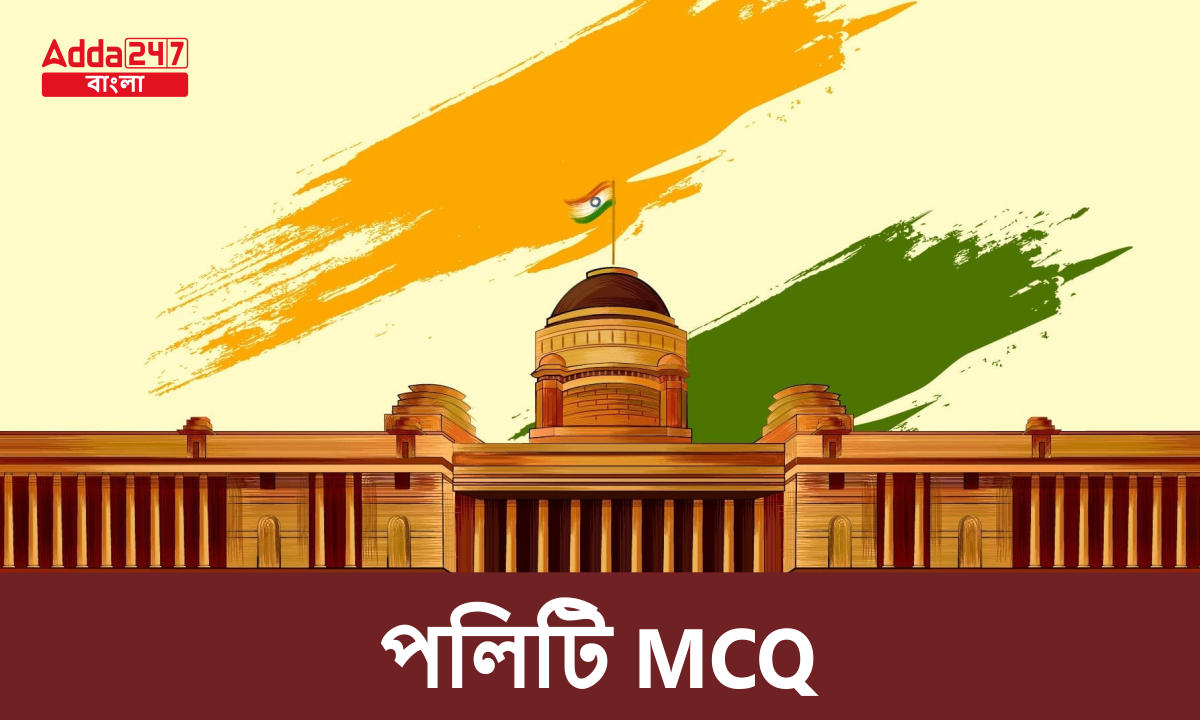পলিটি MCQ: Adda 247-এ আপনাকে স্বাগতম। ADDA 247 বাংলা আপনাকে WBCS, WBSSC, WBP, WBPSC, RAIL,SSC এবং BANK সহ সমস্ত প্রতিযোগিতামূলক পরীক্ষার জন্য বাংলায় পলিটি MCQ দিচ্ছে। এখানে আপনি প্রতিদিন সমাধান সহ একাধিক পছন্দের প্রশ্ন এবং উত্তর পাবেন। এখানে আপনি সমস্ত গুরুত্বপূর্ণ প্রশ্ন এবং উত্তর পাবেন যা আপনাকে আপনার জ্ঞান বাড়াতে এবং আপনাকে আপনার লক্ষ্য পূরণের দিকে এগিয়ে যেতে সাহায্য করবে। এই পলিটি MCQ নিয়মিত পড়ুন এবং পরীক্ষায় সফল হন।
| পলিটি MCQ | |
| বিষয় | পলিটি MCQ |
| বিভাগ | Daily Quiz |
| উদ্দেশ্য | WBCS পরীক্ষা |
পলিটি MCQ
Q1. সংসদ কোন অনুচ্ছেদের অধীনে সংবিধান সংশোধন করতে পারে?
(a) ধারা 269
(b) ধারা 74
(c) ধারা 368
(d) ধারা 374
Q2. ভারতীয় সংবিধানের 360 অনুচ্ছেদ _______কে আর্থিক জরুরি অবস্থা ঘোষণা করার ক্ষমতা দেয়।
(a) ভারতের অর্থমন্ত্রী
(b) ভারতীয় রিজার্ভ ব্যাঙ্কের গভর্নর
(c) ভারতের রাষ্ট্রপতি
(d) ভারতের প্রতিরক্ষা মন্ত্রী
Q3. ভারতের সংবিধানের কোন অনুচ্ছেদে অপরাধের জন্য দোষী সাব্যস্ত হওয়ার ক্ষেত্রে সুরক্ষার বিধান করা হয়েছে?
(a) ধারা 18
(b) ধারা 21
(c) ধারা 20
(d) ধারা 19
Q4. ভারতীয় সংবিধানের পাস্ট দ্যা পোস্ট সিস্টেম অফ ইলেকশন পদ্ধতি কোন দেশের সংবিধান থেকে নেওয়া হয়েছে?
(a) আইরিশ
(b) কানাডিয়ান
(c) মার্কিন যুক্তরাষ্ট্র
(d) ব্রিটিশ
Q5. ভারতীয় সংবিধানের কোন অংশটি পৌরসভা গুলির সাথে সম্পর্কিত?
(a) পার্ট VII
(b) পার্ট VIII
(c) পার্ট XI
(d) পার্ট IX A
Q6. আমাদের সংবিধানে ‘নির্দেশমূলক নীতি’হল
(a) আধা-প্রয়োগযোগ্য
(b) আদালতে বলবৎযোগ্য
(c) আংশিকভাবে অ-প্রয়োগযোগ্য
(d) আদালতে প্রয়োগযোগ্য নয়
Q7. নিম্নলিখিতদের মধ্যে কে পদাধিকারবলে রাজ্যসভার চেয়ারম্যান হন ?
(a) ভারতের উপ-রাষ্ট্রপতি
(b) সংসদের স্পিকার
(c) প্রধানমন্ত্রী
(d) ভারতের রাষ্ট্রপতি
Q8. ভারতে আইন প্রণয়নের চূড়ান্ত কর্তৃত্ব কার আছে?
(a) প্রধানমন্ত্রী
(b) রাষ্ট্রপতি
(c) সংসদ
(d) গভর্নর
Q9. ভারতের সংবিধানের কোন অনুচ্ছেদে ‘রাজ্যপালের ক্ষমা করার ক্ষমতা’ নিয়ে আলোচনা করা হয়েছে?
(a) ধারা 189
(b) ধারা 161
(c) ধারা 173
(d) ধারা 150
Q10. সংবিধানের নিচের কোন তফসিল অনুসারে রাজ্য ও কেন্দ্রশাসিত অঞ্চলগুলিতে রাজ্যসভায় আসন বণ্টনের বিধান রয়েছে?
(a) চতুর্থ
(b) ষষ্ঠ
(c) সপ্তম
(d) দ্বিতীয়
পলিটি MCQ সমাধান
S1.Ans. (c)
Sol. The Parliament may amend the constitution under the rules of Article 368 under Part-XX. The provision was included from South African Constitution.
S2. Ans.(c)
Sol. Financial Emergency under Article 360. If the President is satisfied that there is an economic situation in which the financial stability or credit of India is threatened, he or she can declare financial emergency.
S3.Ans. (c)
Sol. The article 20 is one of the pillars of Fundamental Rights guaranteed by the Constitution of India. It mainly deals with protection of certain rights in case of conviction for offences. When an individual as well as corporation are accused of crime, the provisions of Article 20 safeguard their rights.
S4. Ans. (d)
Sol. The First Past the Post System (FPTP) of election within the Indian Constitution are borrowed from the British Constitution. The First Past the Post (FPTP) system is also known as the single majority system. In this voting method, the candidate with the highest number of votes in a constituency is declared the winner. This system is used in India in direct elections to the Lok Sabha and State Legislative Assemblies.
S5.Ans.(d)
Sol. Constitution (Seventy Forth Amendment) Act, 1992 has introduced a new Part IXA in the Constitution, which deals with Municipalities in an article 243 P to 243 ZG. This amendment, also known as Nagarpalika Act, came into force on 1st June 1993.
S6.Ans.(d)
Sol. The Directive Principles of State Policy are guidelines to the central & state governments of India, to be kept in mind while framing laws & policies. These provisions, contained in Part IV of the Constitution of India, are not enforceable by any court, but the principles laid down therein are considered fundamental in the governance of the country, making it the duty of the State to apply these principles in making laws to establish a just society in the country.
S7 Ans. (a)
Sol. The Vice-President of India is the ex-officio chairperson of Rajya Sabha.
S8. Ans. (c)
Sol. Parliament is the supreme law making body in India and that’s why it is termed as legislature.
S9. Ans. (b)
Sol. As per Article 161, the Governor of a state enjoys pardoning power, where as the same power has been given to President as per Article 72.
S10.Ans. (a)
Sol. The fourth schedule of the Indian Constitution provides for allocation of seats to the states and Union territories in Raya Sabha. The Constitution of India contains 12 schedules, initially it has 8 schedule in the original constitution.




